| Srl | Item |
| 1 |
ID:
171540
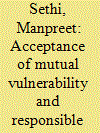

|
|
|
| 2 |
ID:
058362
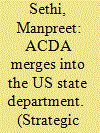

|
|
|
| 3 |
ID:
169647
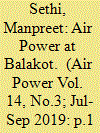

|
|
|
| 4 |
ID:
000744
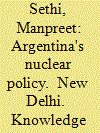

|
|
|
|
|
| Publication |
New Delhi, Knowledge world, 1999.
|
| Description |
x, 220p.
|
| Standard Number |
8186019197
|
|
|
|
|
|
|
|
|
|
|
|
Copies: C:2/I:0,R:0,Q:0
Circulation
| Accession# | Call# | Current Location | Status | Policy | Location |
| 042171 | 355.8251190982/SET 042171 | Main | On Shelf | General | |
| 042172 | 355.8251190982/SET 042172 | Main | On Shelf | General | |
|
|
|
|
| 5 |
ID:
129711
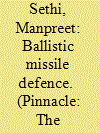

|
|
|
| 6 |
ID:
020030
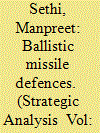

|
|
|
|
|
| Publication |
Sept 2001.
|
| Description |
737-752
|
|
|
|
|
|
|
|
|
|
|
|
|
|
|
|
| 7 |
ID:
138794
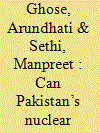

|
|
|
|
|
| Summary/Abstract |
Mark Fitzpatrick, a non-proliferation analyst at the International Institute for Strategic Studies (IISS) in London, is among the latest to hazard solutions to Pakistan’s nuclear dangers and myriad other problems. In his Adelphi book, Overcoming Pakistan’s Nuclear Dangers, he identifies four specific dangers presented by Pakistan’s nuclear programme: the potential for
nuclear use; for a nuclear arms race; for nuclear terrorism; and for onward proliferation and nuclear accidents. After an assessment of each danger, he proffers three recommendations, among them the ‘nuclear normalisation’ of Pakistan, defined as offering the country a nuclear-cooperation deal ‘akin to’ the one given to India in 2008.
|
|
|
|
|
|
|
|
|
|
|
|
|
|
|
|
| 8 |
ID:
135524
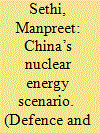

|
|
|
|
|
| Summary/Abstract |
China’s rapid socio-economic transformation, which is today being studies as a model of unprecedented economic growth, was enabled by a phenomenal surge in electricity production and consumption. from a total electricity production base of only 282 billion kilowatt hours (kWh) in 1979, china is today the largest electricity producer at 4604 billion kWh (compared to India’s 835 billion kWh).
|
|
|
|
|
|
|
|
|
|
|
|
|
|
|
|
| 9 |
ID:
114851
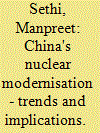

|
|
|
| 10 |
ID:
058487
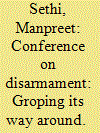

|
|
|
| 11 |
ID:
088518
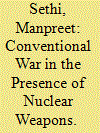

|
|
|
|
|
| Publication |
2009.
|
| Summary/Abstract |
Nuclear weapons cannot obviate wars, but can change its complexion and influence the manner of its conduct. In order to keep nuclear weapons from entering into real warfare, it is important to intelligently judge an adversary's nuclear thresholds and to calibrate one's own conventional strikes. For India, the exploration of this space is particularly important in order to deny Pakistan a free hand to indulge in sub-conventional conflict even as it holds the threat of an all-out nuclear war against an Indian conventional response. This article examines the Indian experience in this regard on the basis of Kargil, 1999. It concludes that limited war - with precise, clearly articulated objectives, calibrated use of military force, and astute use of politico-diplomatic space - offers scope for conduct of conventional war in the presence of nuclear weapons.
|
|
|
|
|
|
|
|
|
|
|
|
|
|
|
|
| 12 |
ID:
148741
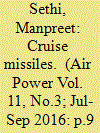

|
|
|
| 13 |
ID:
007207
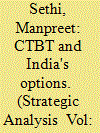

|
|
|
|
|
| Publication |
2000.
|
| Description |
1077-1090
|
|
|
|
|
|
|
|
|
|
|
|
|
|
|
|
| 14 |
ID:
093196
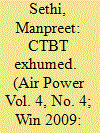

|
|
|
| 15 |
ID:
103445
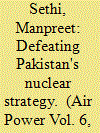

|
|
|
| 16 |
ID:
141027
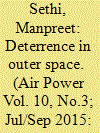

|
|
|
| 17 |
ID:
158756
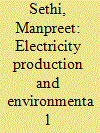

|
|
|
| 18 |
ID:
121656
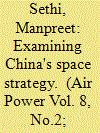

|
|
|
| 19 |
ID:
187517
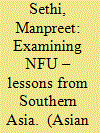

|
|
|
|
|
| Summary/Abstract |
The concept of NFU has been around for many decades, but only two of the nine nuclear armed nations have declared NFU doctrines. Both of these China and India, are in Southern Asia, a region that houses three geographically contiguous states with nuclear weapons. Pakistan, the third nuclear armed country in the region, rejects NFU. The paper examines the disparate positions of the three countries in order to find their motivations for and objections against NFU. By understanding their decisions to accept or reject NFU, one can test the strength of the arguments normally made in favour of first use. The paper showcases the utility of NFU as an effective credible strategy that achieves the objective of deterrence at least risk. Such a posture also demands less onerous arsenal requirements, liberates the decision maker from having to lay down redlines on use of nuclear weapons, and eases the ‘'lose or use’' dilemma of the adversary. Meanwhile, first nuclear use presents itself as not only a dangerous but also non-credible strategy, especially where the adversary has a secure second strike capability. Understanding the benefits of NFU and futility of first use can also help shape global acceptability of NFU as a step towards nuclear disarmament. Till such time as all stakeholders can be convinced of the desirability and feasibility of such a world, acceptance of NFU can be a safe way station.
|
|
|
|
|
|
|
|
|
|
|
|
|
|
|
|
| 20 |
ID:
082400


|
|
|
|
|
| Publication |
2007.
|
| Summary/Abstract |
The article undertakes a generic examination of the global change in understanding export controls with the end of the Cold War and in the wake of new threats of weapons of mass destruction (WMD) proliferation to and by non-state actors. These have necessitated a more inclusive approach to export controls. India, which until now has been outside such regimes, has a special significance since it is a major user, producer and trader of dual-use items and technologies. The article links the global changes with a simultaneous transformation in India's perception of export controls. It contrasts India's past and present approaches to export controls, identifies measures towards their better institutionalisation, highlights implementation challenges unique to the Indian environment and suggests measures to overcome these challenges. The article also argues that while export controls ensure trade with security, they have limited value as tools of non-proliferation, which in order to be sustainable, must not only dry up supply sources but also mitigate demand.
|
|
|
|
|
|
|
|
|
|
|
|
|
|
|
|